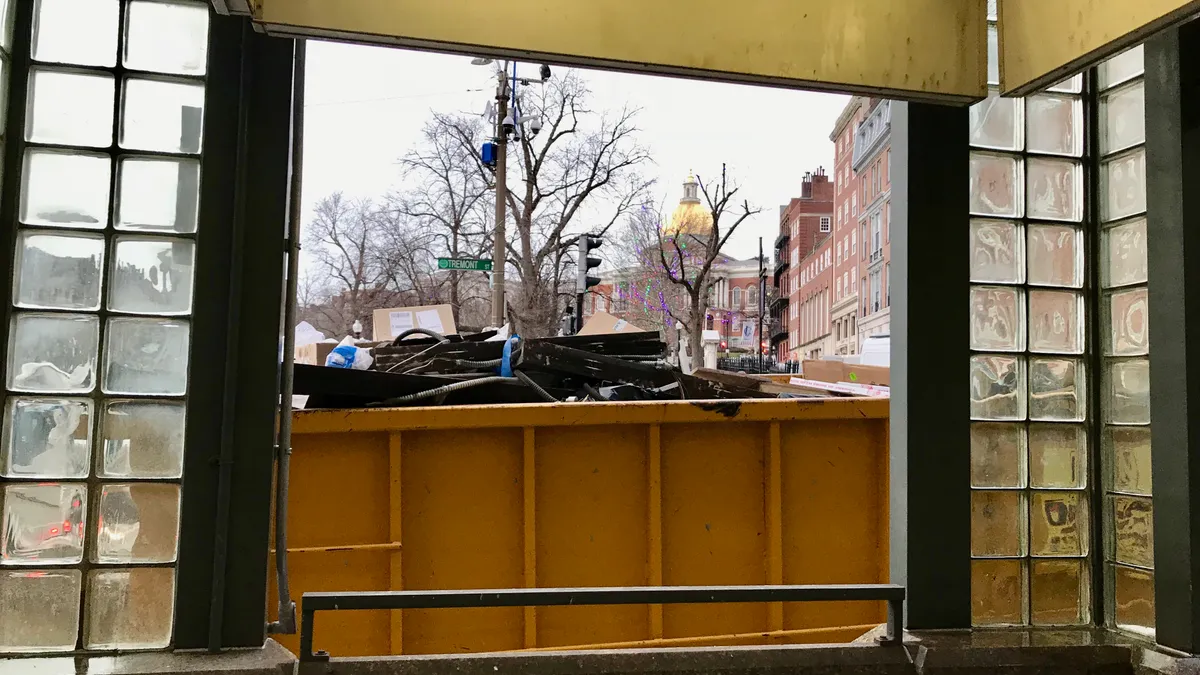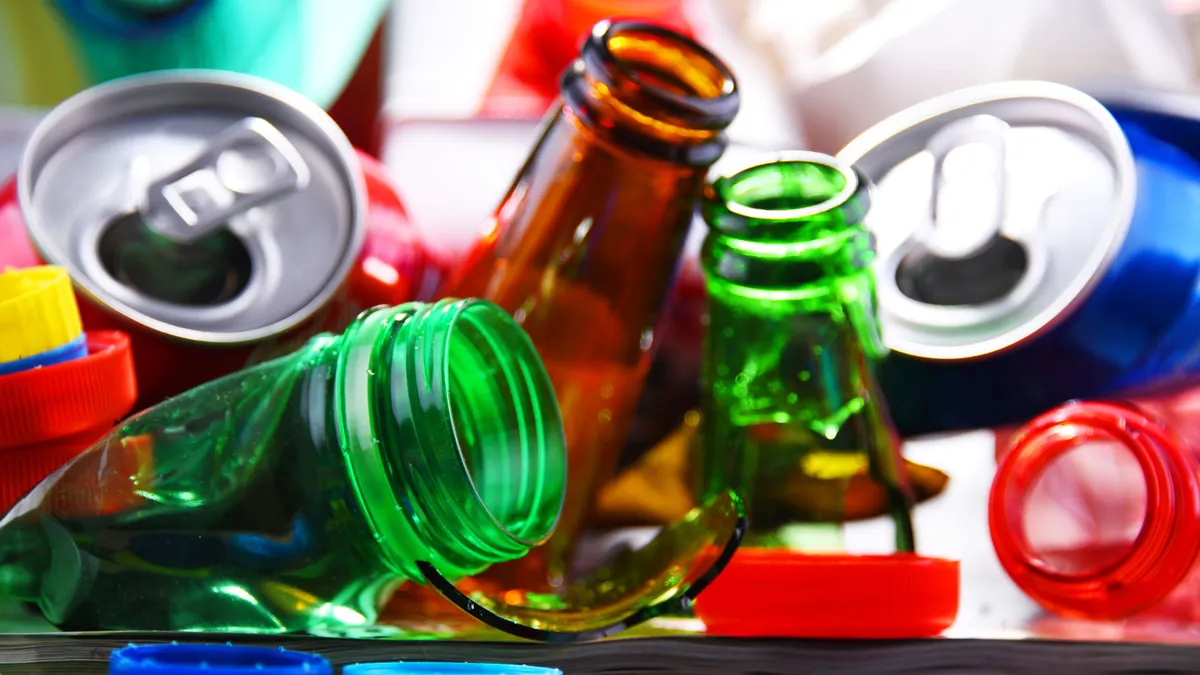The outlook for waste and recycling legislation in Massachusetts this session remains murky, but a recent deadline brought some clarity to which bills are worth watching in the months ahead.
The Massachusetts House of Representatives and Senate, both controlled by Democrats, operate under a joint committee system. One of the rules of that system required joint committees to take action on pending legislation by Feb. 8, a benchmark known as “Joint Rule 10 Day,” otherwise bills are done for the session. Bills that survived the deadline may still be combined or amended.
Bills still face an uphill climb amid competing priorities and the state has not passed any notable waste, recycling or packaging laws for multiple years. Here are some of the top categories to watch in the months ahead. Are you tracking other bills in Massachusetts? Send us an email.
EPR for packaging
Aside from laws addressing certain mercury-containing products, Massachusetts does not have any other form of producer responsibility on the books. Groups such as the Massachusetts Product Stewardship Council (a committee of the group MassRecycle, which includes public and private sector members) have been hoping to change that this session.
“There are states that are using this tool to address the issues that Massachusetts is also facing,” said Waneta Trabert, chair of MassPSC and director of sustainable materials management for the City of Newton, during a Dec. 6 briefing for legislative staff at the Massachusetts State House in Boston. “Our neighbors to the south, Connecticut and Rhode Island, are facing the same challenges as we are on waste capacity and so they're adopting these laws. To the north, in Maine and Vermont they're seeing this as a very strategic policy mechanism to have sustainably funded collection programs."
H.4263 calls for producer responsibility programs to manage many types of common packaging. It was also recently updated to include paint as well as electronics — though there is no language on program specifics about the latter category in the bill yet. The bill was reported favorably by the Joint Committee on Environment and Natural Resources and has been referred to the House Committee on Ways and Means.
MassPSC — and affiliated supporters such as the Massachusetts Municipal Association and Product Stewardship Institute — say that EPR for certain types of packaging would help reduce costs for local governments. Dwindling disposal capacity and higher processing costs at MRFs have become a strain in recent years. The addition of paint is seen as a further cost saving because this material is often managed through increasingly expensive household hazardous waste programs.
The National Waste & Recycling Association’s Massachusetts chapter is “categorically opposed to the EPR for packaging and paper products proposal.” Northeast Region Vice President Lew Dubuque said via email that “Massachusetts currently has a robust and efficient hauler infrastructure to collect recyclables” and speculated this system could raise costs on certain products. “Instead of establishing EPR programs run by producers, a simpler and more effective solution would be setting post-consumer content standards for materials including plastic and paper packaging and containers,” he said.
EPR for mattresses
Massachusetts is the first state to ban the disposal of mattresses, through a 2022 policy by its Department of Environmental Protection. While this has led to more mattress recycling, local waste professionals also say it has made for a more complex system to manage collection of the bulky items and try to ensure residents pay service fees that can sometimes be $75 per item.
This session saw multiple versions of mattress EPR bills, a concept which exists in other states, and they remain in play. H.881 is modeled after Oregon’s mattress EPR law and is supported by the International Sleep Products Association. H.916 is supported by local mattress recycler UTEC, as the bill includes language carving out a place for nonprofit organizations that provide “work opportunities in mattress recycling for individuals facing significant barriers to employment” in alignment with the group’s mission.
The reporting date for each bill was extended to April 12 by the Joint Committee on Environment and Natural Resources, meaning no definitive action has been taken yet. ISPA declined to comment.
Plastics and beverage containers
Another focal point this session has been plastics, leading to a bevy of overlapping bills seeking to limit or ban certain products.
One of the most prominent of that group is S.570. The bill seeks to ban or limit plastic bags, food service ware, certain plastic water bottles and miniature alcohol bottles. It would also set requirements for paper bags and call for a statewide car seat recycling program, among other provisions. While a large share of municipalities in Massachusetts currently ban or limit plastic bags and certain types of service ware, there is no statewide policy.
This bill was reported favorably by the Joint Committee on Environment and Natural Resources and referred to the House Committee on Ways and Means. It was also “accompanied by” 16 other related plastic bills. This means those bills survived the initial hurdle, but observers don’t necessarily anticipate that means they have further traction.
This bill was the focus of a June 1 event at the state house — featuring groups such as Just Zero, Oceana and MassPIRG. Since then, these groups have coalesced with others, including the Conservation Law Foundation, to form the Plastic Free Massachusetts coalition. That group hosted another state house event last month calling on legislators to focus on areas such as plastic bags and updating the bottle bill. Groups such as MassRecycle have also been supportive of updating the bottle bill.
The state’s bottle bill, last updated in 1983, includes a 5-cent deposit rate that critics say is not sufficient. They also note that it does not include many types of newer beverage categories and has a patchwork approach to redemption infrastructure. Beverage companies have historically opposed expanding the state’s bottle bill and a ballot initiative to expand the program failed in 2014.
Multiple bills aimed at revising the system, including variations on a 10-cent deposit and other provisions such as refillable bottles, remain in play.
H.3690 and H.3676, which sit in the Joint Committee on Telecommunications, Utilities and Energy, had their reporting dates extended to April 7. S.2104 made it through, as reported by The Berkshire Eagle, though that has not yet been reflected on the legislature’s website.
The legislature’s two-year session ends on July 31.



















